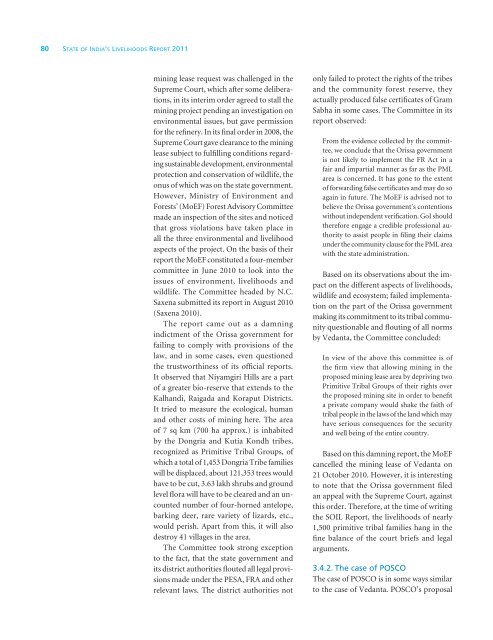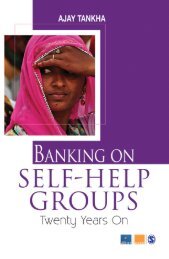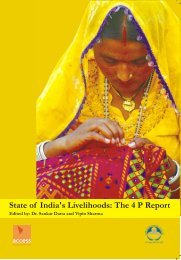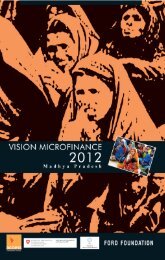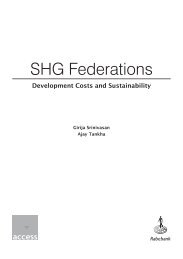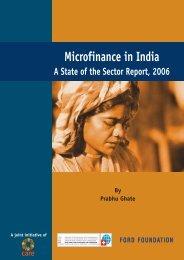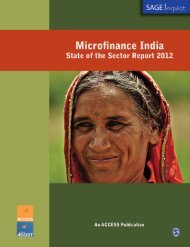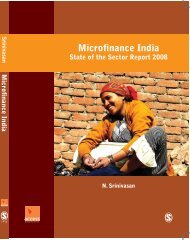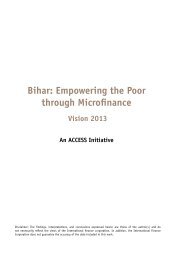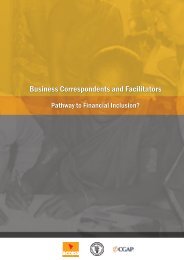SOIL Report 2011 - ACCESS Development Services
SOIL Report 2011 - ACCESS Development Services
SOIL Report 2011 - ACCESS Development Services
- No tags were found...
Create successful ePaper yourself
Turn your PDF publications into a flip-book with our unique Google optimized e-Paper software.
80 State of India’s Livelihoods <strong>Report</strong> <strong>2011</strong>mining lease request was challenged in theSupreme Court, which after some deliberations,in its interim order agreed to stall themining project pending an investigation onenvironmental issues, but gave permissionfor the refinery. In its final order in 2008, theSupreme Court gave clearance to the mininglease subject to fulfilling conditions regardingsustainable development, environmentalprotection and conservation of wildlife, theonus of which was on the state government.However, Ministry of Environment andForests’ (MoEF) Forest Advisory Committeemade an inspection of the sites and noticedthat gross violations have taken place inall the three environmental and livelihoodaspects of the project. On the basis of theirreport the MoEF constituted a four-membercommittee in June 2010 to look into theissues of environment, livelihoods andwildlife. The Committee headed by N.C.Saxena submitted its report in August 2010(Saxena 2010).The report came out as a damningindictment of the Orissa government forfailing to comply with provisions of thelaw, and in some cases, even questionedthe trustworthiness of its official reports.It observed that Niyamgiri Hills are a partof a greater bio-reserve that extends to theKalhandi, Raigada and Koraput Districts.It tried to measure the ecological, humanand other costs of mining here. The areaof 7 sq km (700 ha approx.) is inhabitedby the Dongria and Kutia Kondh tribes,recognized as Primitive Tribal Groups, ofwhich a total of 1,453 Dongria Tribe familieswill be displaced, about 121,353 trees wouldhave to be cut, 3.63 lakh shrubs and groundlevel flora will have to be cleared and an uncountednumber of four-horned antelope,barking deer, rare variety of lizards, etc.,would perish. Apart from this, it will alsodestroy 41 villages in the area.The Committee took strong exceptionto the fact, that the state government andits district authorities flouted all legal provisionsmade under the PESA, FRA and otherrelevant laws. The district authorities notonly failed to protect the rights of the tribesand the community forest reserve, theyactually produced false certificates of GramSabha in some cases. The Committee in itsreport observed:From the evidence collected by the committee,we conclude that the Orissa governmentis not likely to implement the FR Act in afair and impartial manner as far as the PMLarea is concerned. It has gone to the extentof forwarding false certificates and may do soagain in future. The MoEF is advised not tobelieve the Orissa government’s contentionswithout independent verification. GoI shouldtherefore engage a credible professional authorityto assist people in filing their claimsunder the community clause for the PML areawith the state administration.Based on its observations about the impacton the different aspects of livelihoods,wildlife and ecosystem; failed implementationon the part of the Orissa governmentmaking its commitment to its tribal communityquestionable and flouting of all normsby Vedanta, the Committee concluded:In view of the above this committee is ofthe firm view that allowing mining in theproposed mining lease area by depriving twoPrimitive Tribal Groups of their rights overthe proposed mining site in order to benefita private company would shake the faith oftribal people in the laws of the land which mayhave serious consequences for the securityand well being of the entire country.Based on this damning report, the MoEFcancelled the mining lease of Vedanta on21 October 2010. However, it is interestingto note that the Orissa government filedan appeal with the Supreme Court, againstthis order. Therefore, at the time of writingthe <strong>SOIL</strong> <strong>Report</strong>, the livelihoods of nearly1,500 primitive tribal families hang in thefine balance of the court briefs and legalarguments.3.4.2. The case of POSCOThe case of POSCO is in some ways similarto the case of Vedanta. POSCO’s proposal


